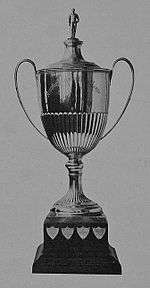Tie Cup
|
The trophy given to champions. | |
| Founded | 1900 |
|---|---|
| Abolished | 1919 |
| Region | Buenos Aires, Rosario, Uruguay |
| Most successful team(s) |
|
The Tie Cup Competition (also known as Copa de Competencia Chevallier Boutell) is a defunct international football tournament played between representatives of the Argentina, Rosario and Uruguay Associations. It was one of the earliest international football tournaments played between members of different national football associations.
The cup was donated by Francis Hepburn Chevallier Boutell, the president of Argentine Association Football League, in 1900. The tournament was played on an annual basis until 1919.[1]
Rules
Between 1900 and 1906 qualifiers from the three associations contested the semi-finals 2 from the Argentine football association, 1 from Rosario and one from the Uruguayan football association.
From 1907 to 1919 only the final match was international, contested between one representative each from Argentina and Uruguay. The participants were determined via qualification cups (Argentine Copa de Competencia Jockey Club and Uruguayan Copa de Competencia).
Finals
The following list includes all the editions of the Tie Cup Competition:[2]
Titles by team
| Team | Titles | Years won |
|---|---|---|
| | 6 | 1901, 1903, 1906, 1907, 1908, 1909 |
| | 3 | 1902, 1904, 1905 |
| | 3 | 1911, 1917, 1918 |
| | 2 | 1913, 1915 |
| | 1 | 1900 |
| | 1 | 1912 |
| | 1 | 1914 |
| | 1 | 1916 |
| | 1 | 1919 |
Titles by nation
| Country | Titles | Teams |
|---|---|---|
| Argentina | 13 | Belgrano AC, Alumni, Rosario AC, San Isidro, River Plate, Boca Juniors |
| Uruguay | 6 | Wanderers, Nacional, Peñarol |
See also
Notes
- 1 2 3 4 5 6 7 After extra time.
- ↑ The football division separated from the club, changing to Club Atlético Peñarol in 1913. Peñarol has been recognized by FIFA as the continuity of CURCC.[3][4] Nevertheless, its main rival, Club Nacional de Football, alleged that CURCC and Peñarol were different clubs which coexisted until 1915, when CURCC was definitely dissolved.
- ↑ Estudiantes (BA) and CURCC played the final, with ended 2-2. A second game should have to be played after that, but it never happened and the tournament was therefore abandoned without proclaiming a champion.
